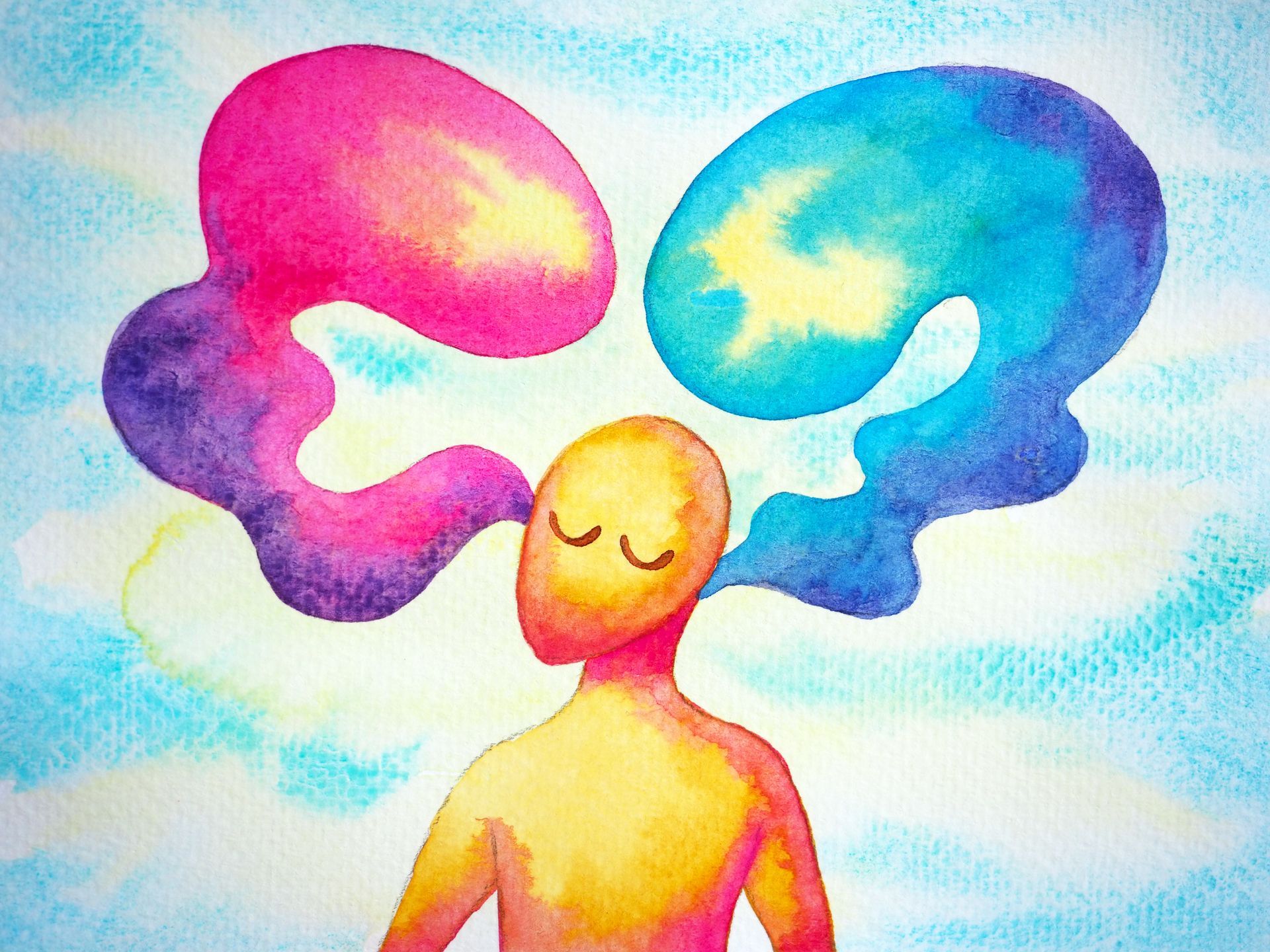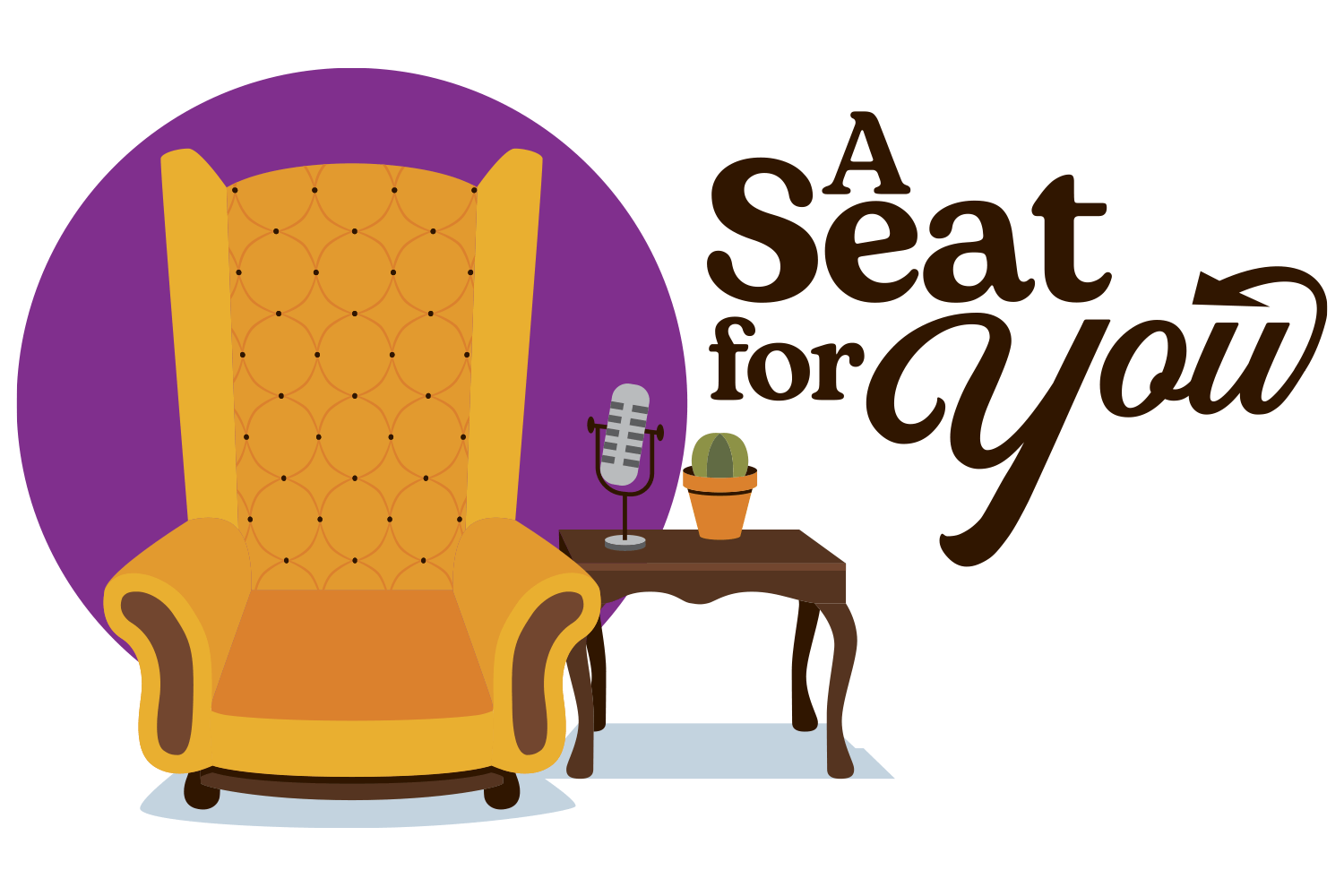Episode 4- Hindsight is 20/20
April: [00:00:00] And I mean like our voices. You normally test our voices.
Leslie: Is that the volume you're gonna speak at?
April: I would say probably, yeah. Okay.
Leslie: Do you think you're gonna like get passionate and yell at all?
April: Do I normally,
Leslie: sometimes you are a nine.
You could get angry like a Hulk.
April: Probably not while recording a podcast.
Leslie: Let's go.
April: Okay. So today we would like to discuss why we're just trying to have nice time despite knowing facts and information. That doesn't sound right, not why.
Leslie: We're gonna discuss how we're living our lives and trying to have a nice time. Right. In spite of knowing facts and information. And information.
Correct.
'cause it's quite challenging.
It's tough
'cause you're just, you're just going along [00:01:00] and then one day new information plops in your lap and
just, well, it's not even like one day, it's like all day. So, I mean, your day could start off great, and then by 10:00 AM you've had an influx of news and information and you're overwhelmed before you even arrive at your job.
Yeah.
And it's just becoming like difficult to just enjoy things that should be enjoyed in life,
to find joy in life.
Yeah.
So gimme an example of something. Is there some recent example that you've had that this happened to you?
Well, I mean, I feel like it's constant, but it really comes from just constant information flooding into our brains.
And it's, for me, my, my social media feed and stuff like that, it's, it's got a balance, I guess you can say, [00:02:00] but not balance, like in a good way, balance in, I see things from both sides and it's, it can be super angering, how people treat people and how they speak to other people. And sometimes I feel like for me, I feel like I've just lost my mind because I'm in this, I'm like a tiny speck in this sea of duplicity.
You know, those, um, there's like a picture of like a thousand black dots, but there's like one red one.
Mm-hmm.
Or one different colored one. That's what I feel like living where I live and not, well, I'm surrounded by people who believe differently than I do about a lot of things.
Yeah.
And I used to blend right in with all of that. But in the last, you know, several years I've moved [00:03:00] and grown past. I don't wanna say past, like it's, you know, a race, but it's, I've grown beyond my boxed thoughts, I guess you can say. And so now I just feel like I'm nuts and trying to have that conversation with people that I, you know, care about and have always had conversations with.
Do you think it's because, like, do you think people fear change or have a hard time with change because they don't like, they don't actively want to learn.
They're perfectly like safe in their space. They're comfortable with people around them. There really is nothing that is urging them or pushing them to think of something.
Yeah, because why would they've got, I mean, they're, they're not, they're not losing anything, you know, and you've got one side that's afraid of [00:04:00] losing rights, and then the other side is afraid of losing the control of those rights.
And so it's hard to talk sense to people who just love the control. It's hard to. Find empathy in them for the people who have lost a good part of their life or, you know, things that are very, very different in their every day.
Yeah, I mean, it's just, it, it really starts with how people are raised, you know, like your whole life experience and you know, you and I both being white, we come from a place of privilege in many aspects and. You know, growing up in certain spaces, it's just automatically assumed that you follow your parents' lead or you do what they do and, and the indoctrination happens when you're a child, right? Mm-hmm. With your parents, um, for whatever, [00:05:00] whatever it is.
It could be anything. It doesn't have to be religious, it doesn't have to be, it could be how you. Like your macaroni and cheese. I mean, you're raised to like something a certain way and, and typically you follow through with that. Right? And so as you go through elementary school and middle school, high school, a lot of our parents really kinda stopped at that high school level.
I mean, some of them maybe took some college or went to college, but you know, I think back then the teachings were different than they are now. And again, if you're in a safe space, You're not really gonna challenge yourself to learn anything new or read anything that's outside of that.
April: Right? There was no one challenging that information back then.
You know? And now there is people challenging information at every corner. You've got, high school kids challenging the system, you know, especially here in Florida. Where there's certain things that are trying to be taught that are, you know, incorrect [00:06:00] and not part of our real American history.
And you've got kids, they're not dumb and they're gonna push back and that wasn't a thing. They didn't, our parents and that generation did not push back because they had no reason to. They had no other source of information telling them otherwise.
Yeah, I mean, I guess with technology in our generation, You know, having access to computers and,
um, it's a blessing and a curse because we know, we know too much now, so that the phrase, you know, ignorance is bliss.
It truly is because you don't have to worry about anything.
Yeah.
You know,
I guess it's bliss depending on who you are, right?
Yeah.
Yeah. Because as long as you're, you know,
I guarantee you a white person came up with that phrase. Yeah.
Leslie: It's much easier and comfortable. If you're not being oppressed.
Right. So, yeah. And that's one of those things, like, that has definitely never been a thought of [00:07:00] mine when I was in my twenties and thirties and forties. Like, I didn't think about privilege that I had growing up, you know? Yeah. I, I would never think, I would never have thought to say, or now, like the first thing that comes to my mind when we're talking about something is, Wow, that comes from a place of privilege.
Like the fact that we even can say that comes from a place of privilege or anything that you see on the news or you see all these, you know, on, on social media with all these Karen videos and ken videos of white people acting a fool in a Burger King, you know, because they didn't get their soda when they felt they should have gotten their soda, and just like the sense of entitlement that you see. I guarantee you, if I would've watched something like that, you know, 20 years ago, I probably wouldn't have thought anything of it. Mm-hmm. Because I wasn't, I wasn't educated or I, I didn't allow myself to, [00:08:00] to have vulnerability and see like how I was part of the problem.
Right. Or what I was. Just enjoying unconsciously, right? That unconscious bias of Oh, just, yeah. You know, until something comes along that now impacts you or now challenges you.
Right. And now, now you open up the floodgates of learning, right. Because you're forced to. And I think that's why the people that, are in oppressed communities are really the people that we should be learning from.
You know, everybody needs to listen to people in oppressed communities, not just the lgbtq plus community or the black community. It's like any community, homeless people, like anybody that's oppressed, I feel like we have a lot to learn from those people specifically because they have the gift of being able to learn and wanting to learn.
Whereas someone who has [00:09:00] already got everything handed to them on a, nice white platter. They have no reason to learn anything else, and so they're not gonna dig. Mm-hmm.
So how does, how does like religion in the church fit into all of this? Because, again, I'm a newbie to, being a Jesus follower if that's, I've always considered myself, you know, more on the spiritual side of things, but to look at Christianity as a whole and, and the Bible and, the rhetoric that's within that space. Um, you know, it's supposedly all about love. You know, Jesus's love and sermon on the mountain, how to treat your neighbor and love your neighbor and, and do all the things. But there, it, it seems to me that there's so much hate that comes out of that space.
For anything that doesn't look or [00:10:00] sound like them. And it's that whole, uh, speck in the eye when you have a log in yours kind of thing, like the judgment. I just, I guess my biggest question around all of this is how is, how is there so much justification for judgment of others when that's exactly what the Bible tells you not to do?
Like, How is that kind of allowed in this space?
April: Well, you've got people who learned the Bible a very specific way, and it's justified because they are under the impression or under the, what's the word? I don't wanna say brainwash, but I guess it's that too, that the Bible is the only knowledge that you need to take in.
And then that's it. You, that is our only form of, instruction. [00:11:00] And if it says it, then it's justified. And so if they come across as hateful, they say, well, that's because God's love is different than our love. And God's love is, a holy love. So if they're trying to say that I'm loving you in a holy way by trying to instruct you, that is how they say that they are loving. Whereas to me, that doesn't make any sense. Because if God's love is different than our love, then why were we created to feel love in certain ways? If I don't feel loved, then you're not showing me love, period. Right. You know what I mean? Right. And so some of that just doesn't add up and it's not, you know, obviously it's not across the board.
But it's a strong majority. And so if, if the Bible is their only source of instruction or how to interact with people, then that's a [00:12:00] problem. And I can probably be called a heretic for saying that. But you, you have to interact with people and, and talk to people and get to know people and learn so that you can grow.
There's no growth if you're not spreading outside your walls. Even Jesus, when he was walking through different towns, getting to know people, the whole reason there are Jews and Gentiles is because he got to know them. You know, like the whole reason that the Gentiles were invited into the church and the Jews hated that because they weren't following the same rules and they weren't doing things right is because Jesus got to know them, and it's not about that.
So he literally changed their minds. On how to interact with people that didn't function like them.
Leslie: Yeah. Well, do you think like the, the influx of new information coming at you all the time, um, again, [00:13:00] because you chose to have new information, like you chose to diversify the feed, so to speak, like Right, follow new people.
Yeah.
Get new information because, I mean, probably four or five years ago you were getting a steady stream of one side of one type of information, right? And that making that choice of allowing new information into the mix is what allows growth and change, right? Mm-hmm. So I wonder, you know,
April: but it also invites anger and confusion and, you know, so many questions as to how something has gone on for so long, or how they don't see it.
You know, so while it's great, it's also like, it's unnerving, you know?
You mean like, um, how people that are in a cult don't know they're in a cult?
Right? Right. It's, or how, like, you know, with this whole [00:14:00] Alabama, uh, boat case thing, you know, I see a lot of is what it is, like exactly how it happened, and then.
You've got the other ones trying to like combat it and you know, trying to justify those guys approaching that man. You know what I mean? Like
Oh really.
So I've got both and it's just like, this is like so disgusting. I'm just so grossed out by so much of what I see. So, yeah.
So how does someone that's in your position absorb all that information?
I mean, do you feel like it's healthy to, um, To allow those kind of like conversations to happen with, without any kind of pushback from others? Or do you feel like it's just, it just becomes a toxic place of a Facebook argument when someone
Yeah, it's toxic
challenges
because you've got so many people with such hard lines on things.
You can't have a conversation with someone who [00:15:00] is a brick wall. Nothing's gonna get through. And that's what everybody seems to be on both sides. Everybody's a brick wall and there's no conversation happening. It's only this is, this is my side, this is the truth, and then it's, this is my side, this is the truth.
Mm-hmm. And so there's no conversation. So really it's just toxic. Yeah. It really is.
Well, I mean that's why we wanted to do this podcast is so that we could have conversations with people that, you know, might think differently or, haven't had an opportunity to be in a space for their voice to be heard.
Um, you know, every, because everybody has a voice. It's just if they have a
space to,
or safety,
yeah, safety in the space to, to communicate. But, um, because I, it just, it's, it's baffling to me and sometimes I just, you know, I don't, I don't see, I don't have those two thought patterns coming into the content that I've chosen.
I did many years ago, [00:16:00] probably, probably two or three years ago, I had, people that would comment or, or post certain things and. I would just be like, wow, you know, I mean obviously as someone who is a part of the L G B T Q community and then to have people that know you and claim to be your friend or you know, or even a family member post things without a thought that, how this might land on somebody else.
It just, that to me shows a lack of empathy or caring, like it's really all about yourself. Like it's self preservation, you know, and you will, you will cut somebody's neck if it means saving your life, right? Like that's, and that's an extreme thing to say, but that's really what it is. I mean, you will present yourself to the public in one way, so [00:17:00] you can have some kind of ego or, or this, this bravado to uphold. Right. But if you're at a family function, are we cool? Everything? Oh, you know, I love you. Like mm-hmm. It's, it's not like you're, it's, it's different. No, it's not different. It's the same freaking thing. Like who, who, it's not different.
You sound like an owl just then.
Yeah. Well, that's me getting passion.
Also. I am going crossey looking at you because there's this pointy foam wall behind you. The um, soundproof. Gray stuff, and it's like one of those, you know, one of those art things where you have to like, kind of cross your eyes to see the image pop out. That's what it looks like right now. And I'm trying to look at you, but I feel one of my eyes is like, drifting.
Well, don't look at me.
I'm looking weird.
Leslie: Don't look at me then
getting a little bit dizzy
anyway, so I just, that's, that's the stuff to me. It's like, how do you engage in positive conversations with people? I [00:18:00] want to understand. Like, I truly want to understand, where, why they have the feelings that they have.
Like what is, what is the fear that they have? And where is the justification in that fear, when you are being so hateful or judgy to somebody else, like, I am more on the side of, like, you do, you and I, I believe I've even said that before. Like you do, you boo like if you want to be a racist, if you want to, uh, flourish in the patriarchy of this society, if you wanna uphold capitalistic principles and focus on accumulating as much as possible without any type of thought to, to this earth and the destruction that you're doing if [00:19:00] you wanna do those things right, I guess that's fine. Right? Where I have a problem with it is when you take your principles and the way you want to live and you want to enforce that onto me, you know, obviously we have to have some kind of laws in this society to, maintain some kind of resemblance of like structure, but, where, where does the line happen? But all I see is people just trying to enforce their way of life on, others. Again, it can be looked at on both sides of the coin. Mm-hmm. Right? But the thing is, it's personal choice.
It's, it's like that, that meme that goes around that says, if you don't, if you're against gay weddings, don't say yes if a gay person asks you to marry them. Right, right. Like if [00:20:00] you are against abortion, don't have to, don't have an abortion. Right. I mean, if you're against women's rights, then I guess go live in a patriarchal commune or something. I, I don't know, like do that, but don't tell me, right, that I can't get married.
Your convictions are your convictions,
or I can't have an abortion, or I can't, you know, vote. Uh, you know what I mean? Like, I can't mail in my vote, or , I can't go drop it off at like, just don't tell me what I can or cannot do.
When, you're a hypocrite because that's exactly what you are trying, that's to the basis of every single argument that's out there right now, which is causing so much division. But the hypocrisy of it all is just astounding, especially when they use the Bible to base their [00:21:00] argument from, because again, as little Jesus newbie over here, everything I've learned so far about what's in the Bible and even Romans, which is used as a battery ram to destroy the lives of people and has surely caused death for many people, is not about that stuff at all. Like, again, hypocrisy of everything that's happening. So I guess that's my biggest rant, and I'll get off my soapbox now.
April: No, I feel you.
And I see it like more clearly all the time. People just put it on display. They put their ignorance and their privilege and their hypocrisy just out for everybody to see, and they don't even realize it. Yeah. And it's just, I'm becoming more and more sickened by it. And I wish I had become sickened by it a long time ago, but better late than never, I guess.
But it's, I don't know. It's a lot. [00:22:00] It's a lot to take in. And it's hard to have conversations like really in person because it seems like everybody's just so scared of each other. You know what I mean? Like we don't even want to talk to people about things because it's gonna get heated and you know you're gonna get upset and you know what I mean?
Mm-hmm. It's just so much fear surrounding everything, and for, especially for a certain group of people that preach to not have any fear, they're the most fearful of everyone. And I don't know if it's because if they, take one pebble off the stack, they're afraid the whole thing is gonna come down, you know, or one question will cause them to question everything. Well, and it, I mean, you said, said that,
And it will, it absolutely will. So, but the difference is, I, I know, I know that my faith is intact. You know what I mean? It's not a, you know, the de, the deconstruction word's a bad word, [00:23:00] of course, but it's not deconstructing to tear it apart and walk away. It is deconstructing so you can learn. It's like taking apart a camera or it something, you know, to see how it works. And then you can put it together and you can have more respect for what you're operating with. And so it's more like that. I'm taking it apart so that I can see where did this come from? Why do we believe this should be done like this?
Is this tradition or is this in the Bible? Did Jesus say to do this? Or did we just make this up and we're upholding nostalgia? Like what is the difference here? And unfortunately, I've come to realize and learn that so much of the practices that we have within specific church, organizations are tradition and are nostalgia and they're respected for those reasons and not necessarily for biblical ones. And so we hold those up. We hold the rules higher than we [00:24:00] hold our two greatest commandments. And that sounds a whole lot like the people we were told not to be like if you're actually reading the Bible, it sounds a whole lot like how the Romans did things, and it sounds a whole lot like we should not be doing this this way, right? Something is deeply wrong and it takes stepping out just honestly just a little bit. It doesn't take much to see it, but if you're airtight in your circle, you're not gonna see it. But the moment you step foot out just a little bit, you will start to see it and you will question, and it's okay.
You need to question everything. You should be questioning everything that you learn, everything that you have grown up with. Because when you learn something as a child, just like learning to walk, learning to eat, you do it without even thinking. It's like breathing, [00:25:00] you know? And so you should question, how did I, how did this happen?
Where did this begin? And then you start thinking about all the conversations you've had. Or I think about the one time in college where I met this girl who was gay in one of my college classes, and you know, obviously I've got my own issues sitting there and I felt the need to share with her all those verses, like a whole page of like the clobber passages.
And I think back and I'm like, Oh my. Why did I do that? Hmm. How could I possibly have done that?
Like, like how did you do that? Like how, how, like how
I, I literally hand wrote it on a paper because we were becoming friends and I really liked her. She was in the military. She was just fun to talk to and we started becoming friends.
And so as someone who was raised, the evangelical, your purpose in life [00:26:00] is, To share Jesus with everybody you come in contact with, like everybody. And so when you care about somebody, you want to make sure that they end up in heaven too, so and so you share, you know what I mean? And so my fear was that she was gonna die and go to hell and I had all the verses.
I written 'em down for her and I never saw her again. She never came back to class.
Wow.
And I don't know if it's because, 'cause she had talked about, um, possibly having to get stationed somewhere and having to leave the school. Mm-hmm. Um, prior to that. So it could have been that, it also could have been my stupid, disgusting letter.
Wow.
And I think about it all the time. I don't even remember what her name was. And it just, it's really like gross because I think back now, like there's just so many people like that. I had no apprehension to do that. I [00:27:00] had no regret doing that. I think I did think to myself, well, hopefully I didn't scare her off, but then I got in my Integra and drove home.
You know, I had no other thoughts of it until, you know, the last few years where I'm like, what did I do? So
Leslie: did you like just hand her this piece of paper and leave or did y'all have a conversation about it?
We were having a conversation and I just, I remember I told her, um, I was thinking about some things and I just wanted to share some things with you.
And so I handed her the piece of paper. It was just like after class we got in our cars and drove off and that was it. Never saw her again. So my thoughts like, okay, did she go to the military? God, I hope it was that. I hope that she didn't go home and, you know, end it. Because those are the types of things that do that.
Wow.
'cause there was no context. There was no, I didn't get to know her enough. And so many people go straight to what they see is the issue. They wanna be doctor and they wanna go straight to what is the obvious [00:28:00] thing. And you know, put the arrow straight in the bullseye there instead of taking the time to get to know somebody as a human being.
You know? And had I done that, it would've been beneficial for both of us. Because I had far more issues than she did. Hmm.
I've never heard that story.
Yeah,
you heard it here first, folks.
April: So on that note, I think that's a Finally got that off my chest. Oh,
Leslie: it's funny. Um,
April: it's not funny.
Leslie: Well, no, it's not funny, but
April: it's terrible.
Leslie: It's nice that you, I mean this is like, like a form of therapy.
April: It is.
Leslie: Because I'm sure you're not, we've listened to podcasts where the person has kind of come clean about something or been vulnerable about experience that they had. Right? And how they, what they, what they regretted about it. And that's one of those things that's like, where maybe a healing piece of that [00:29:00] could be, you know, you journaling a letter to this person, you don't remember their name, but like, just kind of walking through that scenario and the errors to your ways of Right. How you could handle that situation better.
April: And speaking of therapy, the way you treat people and the way that you talk to people are, if they're harsh or whatever, it's your own fears projecting out onto somebody else.
And so those were my own fears. I am part of that community and it was my own fears, , the things that were being pegged at me left and right, not necessarily a person, but in, in the context of my life at that point. Those were the passages and my own fears were coming out on her. Like, if I can't be this, then neither can she.
Leslie: Right?
April: And so that's how that was projecting out. And I, I have told you about our, one of our really good friends growing up that did go to church with us and how we were like thick as thieves and a few of us were, and I won't [00:30:00] say her name just in case she ever listens, but, um, she came out I think around middle school and her, I think her dad probably gave her the hardest time about it.
And so I don't really know what went on at home for her, but she stopped coming around church because I know that she knew that we would not be allowed to hang out with her. Or spend time if everybody knew. And so I think she probably was protecting herself and us by just not coming anymore. And we, we were great friends.
But the problem is that we kind of knew this, but didn't reach out. We didn't continue that close relationship. We didn't chase after her after that, you know, we were kind of under the assumption, oh, she's hanging out with the quote unquote wrong crowd. And going down a bad path, you know, things like that.
So we just out of our own fear did not [00:31:00] pursue. Mm-hmm. And I still talk to her every once in a while, but our relationship was gone, you know, after that, at least in, in the capacity that it was. And so that's sad. 'cause I mean, we pushed her, I think there were more issues that went on with like drug use and things like that, and, That need to to numb almost absolutely came from the church and her home life, you know, at that point,
Leslie: right
April: which her home life was because of the pressure that the church would've put on her parents, you know, that type of thing. And so it's just sucks when you have hindsight 'cause it's so clear sometimes, and you can't undo it.
Leslie: No, you can't undo it, but you can acknowledge it, which you're doing and, try to help others.
April: Yeah.
Leslie: You know, I mean, that's, that's part of it. But we wanted to do something [00:32:00] a little bit different in this episode .
We go to a watermark church and even though we might not get to go in person every week, we always listen to the podcast or watch on YouTube or, or whatever. And, we're going through, uh, Romans right now, which is, you know, those clobber passages like you were talking about, that are used a lot.
And in one of the sermons, Tommy, the pastor was, was Talking about the main one, right? Was what is the Romans? What's the main clobber passage?
April: Oh, it's in Romans one, like the back half of Romans one.
Leslie: Okay, so back half. Romans one, I'm still not, like, I don't, I haven't memorized all them. Numbers and things yet.
So we're gonna play an excerpt.
April: You mean like two Corinthians,
Leslie: right? Book of two Corinthians.
Yeah.
That wasn't me, by the way.
April: Oh, that's great. Um, that was our, one of our former leaders of the free world.
Leslie: Right? Such a religious man. Anyways, um, [00:33:00] so let's play that clip now and then we'll talk about it for a moment.
Yes.
Pastor Tommy-AUDIO: Um, and so like you're all here. And so when I read the book of Romans, I see the weight of it. I see the importance of it because in a way we've all been trained by our ideologies and we've been primed to fight about things. And the gospel directly affects all of this and, and contradicts and pushes back against all of this.
It has been my desire from the very beginning for 20 years now to create a space for all Christians to wrestle with what it means to follow Jesus in our place, in our time. Um, that has always been my desire. And here's what I know. People change their mind. I change my mind. You change your mind. I've got another, I've got another maybe 40 years on this planet.
If I don't, they always say if I don't get hit by a bus, I don't know why buses are such a big threat. I've got another 40 years and. [00:34:00] I'm probably gonna change my mind. Two, three diff different times. I've changed my mind. Innumerably, as I look back, those of you who aren't changing, your mind aren't reading, you're not wrestling, you're not paying attention.
Leslie: So you're not reading, you're not growing.
April: You're not paying attention.
Leslie: You're not paying attention.
April: Yeah. And I think that if you think that you have nothing to learn, if we think we have nothing to learn from each other, then our growth is done. Period.
Leslie: Absolutely.
April: And so we have to pay attention and the only way to pay attention is to actually pay attention. Step outside your box just for a few minutes and get to know some people that you wouldn't normally get to know.
Leslie: And actually have empathy for others.
April: Right. Well, that [00:35:00] doesn't come naturally for some people.
It has to be brought to them in a personal way for that to even occur. Mm-hmm. People, there's people who don't naturally have empathy. Probably a lot of people don't have just natural empathy for putting themselves in someone else's shoes and feeling the pain that they could feel. As a nine. I do that well, which is why I'm so tired all the time.
That's why I need naps.
Leslie: Well, I also think it's interesting that because you are Enneagram nine and you always can see both sides of the story,
April: it's exhausting
Leslie: that you, but you. You have a choice.
April: Do I,?
Leslie: You have a choice to eliminate one of those sides from like your newsfeed, like
Oh yeah. From my
April: newsfeed, yes.
Leslie: You know what I mean? Like, like you have a choice of what comes in there, but I think it's your natural tendency to where you need to [00:36:00] see both sides.
April: Well, uh, I mean, how are we supposed to diversify our feed and have, you know, other people at the table who don't think about us unless we have those types of sources.
Leslie: Yeah. I guess for me it's, it's controlling how much of those sources come in there, because again, like you said, you're, it's exhausting. Mm-hmm. It's mentally taxing and mentally exhausting, and I think for some people it's confusing and so then they're just constantly in this state of flight or fight.
April: Right. So they're just like, screw it.
Leslie: Yeah. And, and it, it's just, it's not healthy. You know? Right. And so I think you can, you can find ways to understand what's going on in places that are different places that you would typically be in, versus welcoming a steady stream of that information into your world, like Right.
I don't, I just,
April: I can also just not look at my phone. [00:37:00]
Right. I think that's, that's the key message, learning for the day. Just stay off your phone people
just, yeah, just stay off your phone. Give, give yourself some, some air Walk outside. Well, maybe not walk outside. If you live in Florida, just it's, you might die if you walk outside.
Leslie: You could take a nice walk and listen to this podcast.
April: Yeah. At night.
Leslie: At night when it's cooler.
All right, well, let's wrap this episode up today and, um, again, if you would like
to, well,
April: we had a, we had like a, a question.
Leslie: Okay.
April: It was how can we reframe and reset when we, when the info bucket is overflowing and overwhelming so that we can enjoy life?
Leslie: So is this a question we want people to answer about or just think We can
April: just think about it. I mean, we can throw out some ideas.
Leslie: So maybe like in our next episode, we can answer this question.
April: Yeah. But you'd be stewing on it for a little bit.[00:38:00] Put a pin in that
Leslie: dork.













